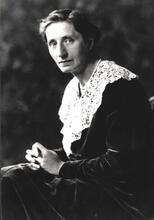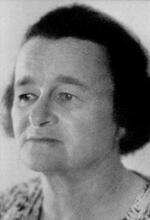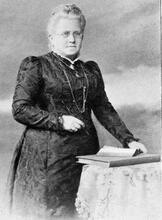Josephine Levy-Rathenau
Josephine Levy-Rathenau was an influential women’s rights advocate, social democrat, and pioneer of professional social work. Her major life’s work was establishing the first career guidance offices in Germany for girls and women, at a time when no equivalent existed for males. A woman of means embedded in elite Berlin-Jewish culture, Levy-Rathenau became – paradoxically – a life-long proponent of women's work. She founded a newspaper bulletin focusing on women's vocations and published three books and around 100 articles. She also served as head of the Vocational Office of the German women's movement and helped found the National Women's Service during the First World War. Levy-Rathenau was among the first women to serve on the Berlin city council and its executive body in interwar Germany.
A Child of Two Worlds
Josephine Levy-Rathenau was born in Berlin on July 3, 1877, into a world of power and privilege. Her father Oscar Rathenau (1840–1926) was a fabric wholesaler turned commercial judge. Her mother Hermine “Blanka” Goldberger (1849–1906), sometimes known by her second name, was a voluntary welfare worker and homemaker, raising Levy-Rathenau and her two brothers Fritz (1875–1949) and Kurt (1880–1942), after suffering the tragic loss of her eldest, Lothar Joseph (1871–1872), as an infant. Levy-Rathenau’s forebears, among them notable bankers and synagogue founders, had resided in Germany since the eighteenth century. Having a family tree full of historically important figures such as her cousin, later German foreign minister Walther Rathenau (1867–1922), proved a mixed blessing. Levy-Rathenau’s family fortune and marriage to X-ray entrepreneur Max Levy (1869–1932) provided her with the social status and financial security to pursue unpaid pioneering work. Yet being surrounded by a host of distinguished male relations obscured her legacy of work on important women’s issues.
Levy-Rathenau’s upbringing had a formative influence on her later public career. At the prestigious girls’ grammar school Charlottenschule, she socialized with Jews and non-Jews. The study of both Jewish and Christian scriptures ignited her passion for social justice, but it was Judaism that framed family life for the Rathenaus, who regularly attended synagogue and celebrated Jewish holidays. The Rathenau children were inculcated with a sense of liberal Jewish morality devoid of strict observance of Jewish law. Levy-Rathenau embraced the two worlds that marked acculturated Berlin-Jewish society and moved seamlessly between them in her later career.
A Social Work Pioneer in the Making
Levy-Rathenau’s professional trajectory was as much a culmination of family tradition as it was a departure from it. In most German states, women were still prohibited from pursuing higher education, and vocational training opportunities were scarce. Women of the middle class were typically expected to lead domestic, dependent lives. Levy-Rathenau defied social conventions by joining the so-called Girls’ and Women’s Groups for Auxiliary Social Work (the “Groups”), a pioneering training program founded in Berlin in 1893 and inspired by the English and American Settlement movements.
In the Groups, Levy-Rathenau and her peers were educated by some of the brightest minds in the latest advances in social and medical sciences. Students were assigned to divisions (“groups”) of practical work experience, such as childcare and sick relief, aimed at alleviating working-class women’s daily burdens. Here Levy-Rathenau discovered her calling, making important personal and professional connections. She apprenticed for three years under Emil Münsterberg (1855–1911), an esteemed social scientist and head of the Berlin Welfare Office. Through the Groups, Levy-Rathenau also became acquainted with Alice Salomon, with whom she partnered professionally on several future occasions.
Professionalizing in welfare work was a strategic choice for Levy-Rathenau. It was typically unwaged and therefore not considered a male domain per se. Levy-Rathenau’s family had a long history of philanthropic engagement; both her parents were prominently involved in a number of Jewish welfare organisations. At 22, Levy-Rathenau became the driving force of the first German Women’s Club in Berlin, putting her training and leadership skills to the test. The Club, a relaxing space for exchange among working women, contributed to Levy-Rathenau’s growing conviction that social and professional interaction between women of different classes could foster social justice and solidarity.
Social Work as a Feminist Project
Levy-Rathenau’s career focus crystallized in the German women’s movement. Better known to her peers for her political engagement in the German Democratic Party than for her feminism (contrary to many middle-class German feminists, she endorsed female suffrage), Levy-Rathenau was drawn to the women’s movement despite its self-characterization as “apolitical.” The movement’s emphasis on women’s education and access to work provided a natural setting for Levy-Rathenau to work out her activist aspirations.
In 1902 Levy-Rathenau succeeded Alice Salomon as the leader of feminist Information Office for Women’s Interests, a position she held for two decades until her death. The office, founded by Jeannette Schwerin (1852–1899), sought to empower women to economic independence and to realize their vocational aspirations. During Levy-Rathenau’s tenure, the Office developed into the first full-fledged career counselling service in Germany, tailored to women’s needs. It offered not only a library with resources to help women navigate the job market and vocational training opportunities, but also personal guidance by trained counsellors who could help assess suitability for jobs and help women avert obstacles they might face due to their sex. Similar offices soon mushroomed across Germany, all united in 1911 under the leadership of Josephine Levy-Rathenau and the centralized Women’s Vocational Office in Berlin.
The First World War
The First World War was transformative for the work of Levy-Rathenau and her colleagues. Within weeks of the declaration of war on August 1, 1914, German public authorities found themselves overwhelmed. War wives and widows queued by the thousands for benefits, foodstuffs, and information. Women workers, concentrated in industries non-essential to the war effort, suffered disproportionately from layoffs. A wartime National Women’s Service (the NWS) was set up to coordinate women’s voluntary auxiliary services to provide relief. Professionally trained social workers were drafted to oversee and mentor volunteers. For the newly trained, it was a baptism of fire. For Levy-Rathenau and other more seasoned workers, the war provided an unprecedented opportunity to expand the professional reach and status of social work, though at a great personal cost for many.
Levy-Rathenau was appointed head of the NWS’s Berlin branch, from which she administered the voluntary relief work of 23 district offices; Alice Salomon joined her as executive co-chair at the end of the war. The work of the NWS concentrated mainly on military families and unemployed women, with a reported 230,000 war dependants seeking help from the Berlin NWS in the first few months alone. The authorities gratefully channelled overflow work to Levy-Rathenau and her organization. The NWS also co-managed a municipal agency to broker between employers and employees, a job center, and military sewing rooms to provide emergency work for women.
Cooperation between public authorities and the German women’s movement reached unprecedented levels during the war. Levy-Rathenau personally formed a crucial link in many joint ventures. The war was a watershed moment through which social work pioneers gained insight into the existing public welfare bureaucracy and received the acknowledgement they craved from politicians and public servants. As far as Levy-Rathenau was concerned, the war years shaped her professional trajectory, propelling her into local politics in post-war Berlin.
Writer and Political Freedom Fighter
Levy-Rathenau was not a theorist but rather a practical pathfinder. Yet her views on women’s rights and role in society permeate the instructional volumes, books, articles and reports she authored. Her first noteworthy publication, co-authored by Lisbeth Wilbrandt, appeared in 1906. The German Woman in Occupational Work was unparalleled in its scope and sophistication. Over the following decade, Levy-Rathenau produced five editions of the manual, which aimed to give a realistic and up-to-date depiction of women’s chances on the job market based on extensive surveys. As a complement, Levy-Rathenau published Women’s Occupations and Professions, a supplement to the main newspaper of the German feminist Federation, and around 100 articles.
Levy-Rathenau’s writings, like her practical activism, conveyed the basic belief that Germany needed its women workers as much as its women needed to work in order to flourish. The middle-class women’s movement she was part of emphasized women’s primary role as mothers and homemakers. Levy-Rathenau, who had no children of her own, saw her purpose differently. She rejected economic independence and choice of vocation as male prerogatives. She repeatedly wrote about the greater importance of the contemporary social, biological, and psychological sciences over tradition or class-specific ideas about gender. Individual differences, Levy-Rathenau argued, rather than gendered differences should be the sole basis for determining a person’s suitability for an occupation.
Unlike many contemporary feminists, Levy-Rathenau’s definition of women’s cause extended to the working class. If middle-class girls lacked the chance to fulfil their potential, working-class women were drawn into harmful circumstances due to their lack of proper vocational training and guidance. As a young trainee in the Groups, Levy-Rathenau had become acutely aware of the daily struggles of urban working-class families. On a business trip with her husband as early as 1903, Levy-Rathenau carefully studied and reported on the appalling working conditions of women in a Sevillian tobacco factory. Back home, she involved herself forcefully on behalf of her husband’s employees, who by the 1920s numbered around 800.
Levy-Rathenau considered a meaningful professional life in sound working conditions to be every woman’s right. Career counselling could direct women into the right vocational education and jobs, while simultaneously opening up a new branch of an emerging women’s field: social work. Levy-Rathenau demanded concrete measures to increase access; the technical sector, she elaborated in one of her books, was an example of a field ripe with opportunities for female jobseekers. Together with Marie-Elisabeth Lüders (1878–1966), later a parliamentarian, Levy-Rathenau successfully lobbied for the admission of German women to craftsman’s exams, professional guilds, and apprenticeships.
Levy-Rathenau did not subscribe to socialism, despite her otherwise progressive values. Her instructional literature vividly demonstrates her belief in socio-economic mobility under capitalism, something of which she had both direct and indirect experience from assisting her husband in his business, and as a descendant of the Jewish commercial class. She found the German Democratic Party a better fit with her worldview and political ambitions. In May 1920, she was elected one of the first female members of the Senate of Berlin charged with overseeing three departments, including the city’s offices for occupations and statistics.
Just before her death, Levy-Rathenau saw a dream come to fruition: the German authorities acknowledged the importance of career counselling and the first public career office was established in Berlin in 1920. Levy-Rathenau moved on to develop the public welfare office in her home district of Tiergarten, in many ways the culmination of her career.
Josephine Levy-Rathenau passed away at the age of 44 on November 15, 1921, from long-term illness. Members of the Berlin intelligentsia gathered at her home to pay their respects, including Jews and non-Jews, leading feminists, social reformers, and the mayor of Berlin.
Selected Works by Josephine Levy-Rathenau
The Vocational Work of the German Woman: Practical Advice for Career Choice (Die deutsche Frau im Beruf: Praktische Ratschläge zur Berufswahl), 1–5. Berlin, 1906–1917.
Democratic Vocational Policies for Women (Demokratische Frauenberufspolitik). Berlin: Demokratischer Verlag Berlin, [1920].
The Woman as a Technical Clerk (Die Frau als Technische Angestellte). Berlin: Teubner, 1914.
“The Past and the Future of Women’s Career Counselling” (“Die Vergangenheit und Zukunft der Frauenberufsberatung”). Imperial Journal for Labour, Unofficial Supplement (Reichs-Arbeitsblatt, Nichtamtlicher Teil) No. 28 (1921): 1192–5.
Travel diary “Trip to Spain” by Josephine Levy-Rathenau (1877–1921) (Reisetagebuch “Spanische Reise” von Josephine Levy-Rathenau (1877-1921). Berlin, 1903. Courtesy of Jewish Museum Berlin, Inv. No. 2001/106/807.
Travel diary “Greece and Constantinopel” (“Griechenland und Constantinopel”). Berlin, 1908. Jewish Museum Berlin, Inv. No. 2001/106/808.
Bäumer, Gertrud. “Address at the Funeral Service on November 18, 1921” (Ansprache bei der Trauerfeier 18. Nov. 1921), in Josephine Levy Rathenau in memoriam (Josephine Levy Rathenau zum Gedächtnis) [1922?].
Boyd, Catherine Elaine. “Nationaler Frauendienst: German Middle-Class Women in the Service of the Fatherland, 1914–1918.” PhD diss., University of Georgia, 1979.
Ernst, Johanna. Josephine Levy-Rathenau and Career Counselling. A Contribution to the history of career counselling in Germany (Josephine Levy-Rathenau und die Berufsberatung. Ein Beitrag zur Geschichte der Berufsberatung in Deutschland). Berlin: Verlag von Leonhard Simion Rf., 1922. Courtesy of the Archive of the German Women’s Movement (Archiv der deutschen Frauenbewegung), Kassel.
Fassman, Irmgard Maya. Jewish Women in the German Women’s Movement 1865–1919 (Jüdinnen in der deutschen Frauenbewegung 1865–1919). Hildesheim: Olms, 1996.
Levy, Max. “In Memory of my Wife” (“Dem Andenken meiner Frau”), in Josephine Levy Rathenau in memoriam (Josephine Levy Rathenau zum Gedächtnis) [1922?].
Lüders, Marie Elisabeth. Do Not Fear: Personal and Political Reflections from more than 80 Years, 1878–1962 (Fürchte Dich Nicht: Persönliches und Politisches aus mehr als 80 Jahren, 1878–1962). Cologne and Opladen: Westdeutscher Verlag, 1963.
Nürnberger, Jürgen, and Dieter Maier. Josephine Levy-Rathenau: Women’s Emancipation through Career Counselling (Josephine Levy-Rathenau: Frauenemanzipation durch Berufsberatung). Berlin: Hentrich & Hentrich, 2013.
Rathenau, Fritz. 1895-1935: A Jew in the Service of Empire and State (Als Jude im Dienste von Reich und Staat). [1948]. Leo Baeck Institute Memoir Collection, ME 511, Leo Baeck Institute Archives.
Rink, Thomas, Double Loyalty: Fritz Rathenau as German Civil Servant and Jew (Doppelte Loyalität: Fritz Rathenau als deutscher Beamter und Jude). Hildesheim: Olms, 2002.
Further reading:
Nürnberger, Jürgen, and Dieter Maier. “Josephine Levy-Rathenau (1877–1921): A Life lived for Career Counselling” (“Josephine Levy-Rathenau (1877–1921): Ein Leben für die Berufsberatung”). In Pioneers and Creators of the Labour Market: Eleven Biographies about the History of the German Labour Administration (Vordenker und Gestalter des Arbeitsmarktes: Elf Biografien zur Geschichte der Deutschen Arbeitsverwaltung, ed. by Dieter G. Maier, Jürgen Nürnberger and Stefan Pabst, HdBA (Hochschule der Bundesagentur für Arbeit) Bericht, no. 5: 73–95.
http://www.blankgenealogy.com/histories/Biographies/Levy/Biography%20Jo…
Käpplinger, Bernd, “Walking between the lines: Josephine Levy-Rathenau (1877–1921).” Pedagogika Społeczna 75, no. 1 (September 2020): 155–64.
URL: https://www.researchgate.net/publication/344248526_Walking_between_the_…;







